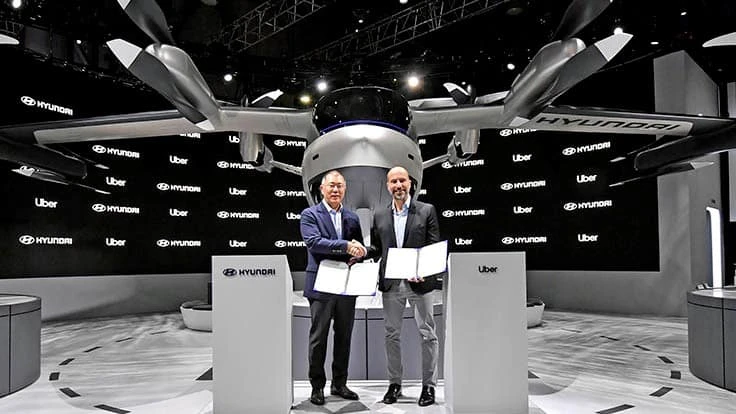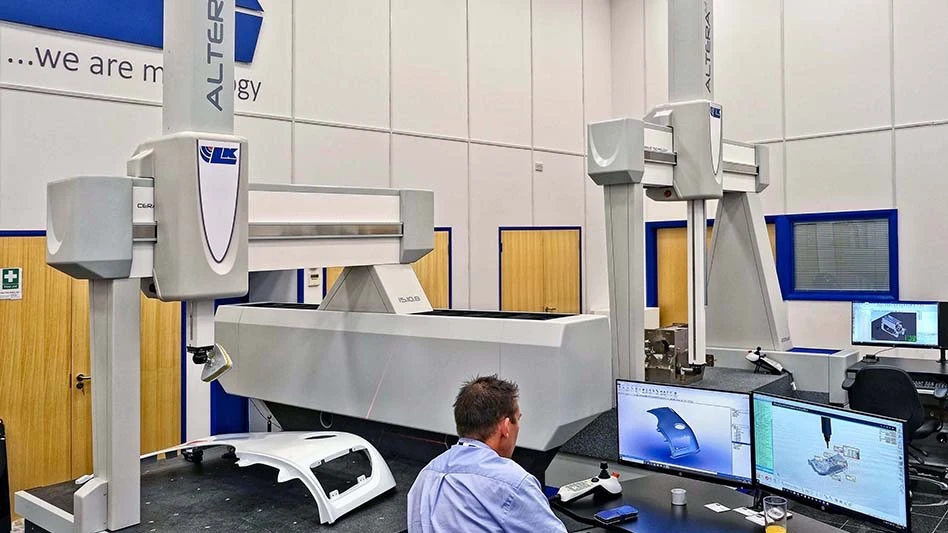
Hyundai Motor Co.
Hyundai Motor Co. and Uber officials have announced a new partnership to develop Uber Air Taxis for a future aerial ride share network and unveiled a full-scale aircraft concept at the Consumer Electronics Show (CES) in Las Vegas.
Hyundai is the first automotive company to join the Uber Elevate initiative, bringing automotive-scale manufacturing capability and a track record of mass-producing electric vehicles. Hyundai’s air vehicle concept was created in part through Uber’s open design process, a NASA-inspired approach that jump-starts innovation by publicly releasing vehicle design concepts so any company can use them to innovate their air taxi models and engineering technologies.
In this partnership, Hyundai will produce and deploy the air vehicles, and Uber will provide airspace support services, connections to ground transportation, and customer interfaces through an aerial ride share network. Both parties are collaborating on infrastructure concepts to support take-off and landing for this new class of vehicles.
"Through the partnership with Uber, we will accelerate efforts to harness Hyundai's businesses and technologies to deliver true freedom of mobility," said Euisun Chung, executive vice chairman of Hyundai Motor Group.
"Hyundai's large-scale manufacturing capabilities offer a major step forward for Uber Elevate. As Hyundai taps its automotive industry experience to mass produce air taxis, we will be able to more quickly take Uber's platform into the skies, expanding affordable and seamless transportation in cities around the world," said Uber CEO Dara Khosrowshahi.
“Our vision of urban air mobility (UAM) will transform the concept of urban transportation,” said Jaiwon Shin, executive vice president and head of Hyundai’s Urban Air Mobility (UAM) division. “We expect UAM to vitalize urban communities and provide more quality time to people. We are confident that Uber Elevate is the right partner to make this innovative product readily available to as many customers as possible.”
“We believe Hyundai has the potential to build Uber Air vehicles at rates unseen in the current aerospace industry, producing high quality, reliable aircraft at high volumes to drive down passenger costs per trip,” said Eric Allison, head of Uber Elevate.
Hyundai worked with Uber Elevate to develop a personal air vehicle (PAV) model, S-A1, an electric vertical take-off and landing (eVTOL) aircraft for aerial ridesharing purposes.
The Elevate initiative used NASA’s historical approach of putting design concepts out publicly to inspire innovation amongst multiple companies, spurring the development of common research models to investigate novel aerodynamic concepts and catalyzing industry progress in wing design, noise, aerodynamics, and simulation verification. As a result, Hyundai’s S-A1 model unveiled at CES reflects previously announced Uber Elevate eVTOL designs:
- Designed for a cruising speed up to 180mph (290km/hr), cruising altitude of around 1,000ft-to-2,000ft (300m-to-600m) above ground, to fly trips up to 60 miles (100km)
- 100% electric; during peak hours will require 5 to 7 minutes for recharging
- Distributed electric propulsion, powering multiple rotors and propellers around the airframe to increase safety by decreasing any single point of failure. Having several, smaller rotors also reduces noise relative to large rotor helicopters with combustion engines, which is important to cities
- Takes off vertically, transitions to wing-borne lift in cruise, transitions back to vertical flight to land
- Piloted initially, but eventually will become autonomous
- Cabin with 4 passenger seats, allows riders to board/disembark easily with space for a personal bag or backpack

Hyundai’s exploration of future urban transportation incorporates the electric PAV concept with ground transportation, the purpose built vehicle (PBV) concept, linked with an infrastructure concept called the Hub. PBVs and PAVs docked and connected to a Hub offer a new public space where diverse groups of people can come together.
Uber has announced a goal of flight demonstrations in 2020 and Elevate commercially available to riders in 2023. [Hyundai leadership expects it to be 2028.]
Uber has partnerships with other manufacturers including Boeing subsidiary Aurora Flight Sciences, Bell, Embraer, Joby Aviation, Pipistrel Aircraft, Karem Aircraft, and Jaunt Air Mobility. Uber also has two Space Act Agreements with NASA: one for the development of new Unmanned Traffic Management concepts and Unmanned Aerial Systems and another to explore concepts and technologies for Urban Air Mobility.
Latest from EV Design & Manufacturing
- Best of 2024: #9 Article: Precision fluid dispensing: Improving process control in EV battery manufacturing
- Best of 2024: #9 News: Data reveals electric vehicles create more jobs than internal combustion engines
- Best of 2024: #10 Article: A dicing proposition: driving zero defects in today’s intelligent vehicles
- Best of 2024: #10 News: General Motors rebrands Ultium battery platform, modifies EV strategy
- Hundreds of ultra-fast electric vehicle charging ports to be installed across United States
- Hyundai Mobis introduces electric vehicle battery cooling technology
- Wide-creepage option now available for integrated circuits
- New study delivers promising news for future electric vehicle battery manufacturing





